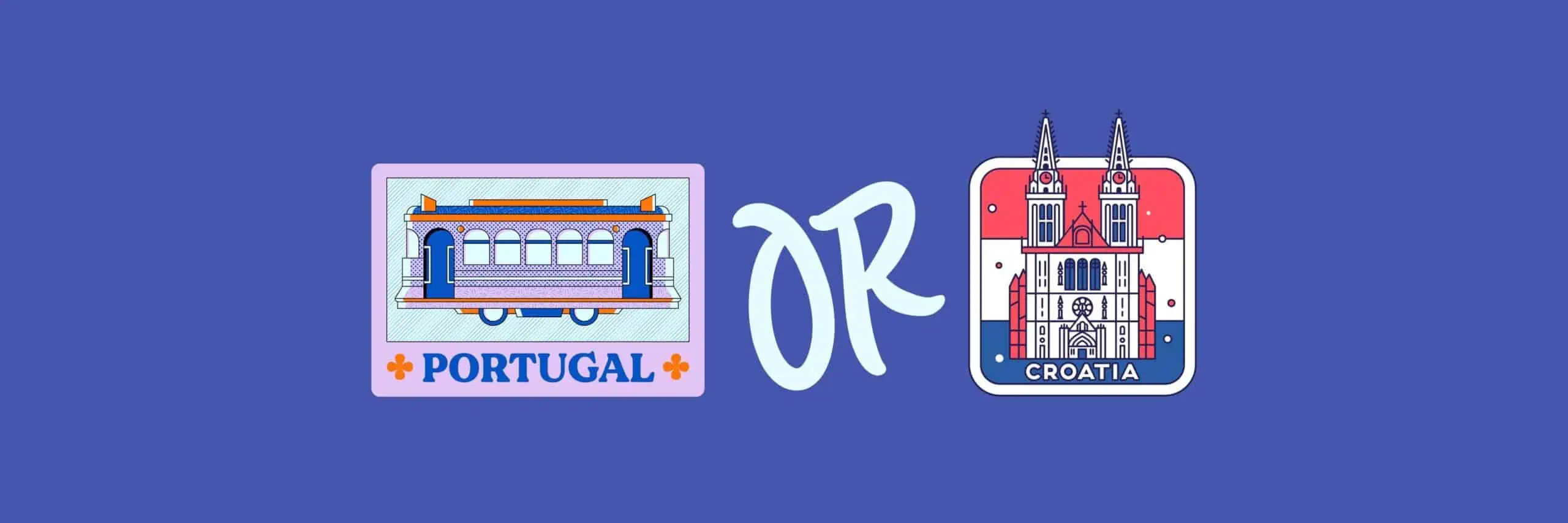As recently as five years ago, there were only a handful of digital nomad visas (DNV) in the world. Today, over 50 countries offer DNVs to remote workers who dream of living abroad while serving their clients or employers. Both Portugal and Croatia are among European countries that have DNVs, and each is popular with digital nomads.
Table of contents
- Expat Profiles: Canadian Digital Nomads
- Portugal vs Croatia: Two of The Best Places for Digital Nomads in Europe
- Do Digital Nomads Pay Taxes in Portugal and Croatia?
- Why You Should Choose Portugal as Your Next Digital Nomad Destination
- How Can Contractor Taxation Help in Portugal or Croatia for Digital Nomads?
- Our contractors usually asked these questions about contracting in Bali
- More on Portugal and Digital Nomadism Topics
With so many variables how does one even begin to choose the best destination between Portugal or Croatia for digital nomads?
How to choose a digital nomad base? Which is more important: the lifestyle, visa criteria or cost of living?
What are some of the pitfalls of working under a DNV?
Expat Profiles: Canadian Digital Nomads
Anna and Beatrice were friends from Canada who had been working remotely as digital nomads for a few years in Latin America. While they were happy in the culture, they both were looking for a more European location and lifestyle.
Specifically, they wanted to work under a DNV rather than try to obtain a self-employment visa. Immigration had been a major hurdle for them in Latin America, and they wanted an easier solution.
They had narrowed it down to Portugal and Croatia, with each country offering much of what they wanted, as well as a DNV. Anna preferred Portugal, while Beatrice was drawn to the Eastern European ambience of Croatia.
The first thing they did was evaluate the differences between the DNVs of the two countries:
Portugal Digital Nomad Visa:
Portugal digital nomads require a minimum income of EUR 3000 monthly, with proof of income the previous three months.
There are two types of DNVs, a short stay which is valid up to one year, or a residency visa which can be valid for five years. The second type of DNV can lead to permanent residency if desired. This is fairly unique for DNVs which usually don’t have a residency option.
Croatia Digital Nomad Visa:
The Croatian DNV is valid for a maximum of 6-12 months,and is renewable only after departing the country for 90 days. This is not really convenient if you have your accommodation, workspace and expat social life all set up in Croatia. The monthly minimum income is EUR 2500 for the previous six months evidenced by bank statements.
Comparing the two digital nomad destinations:
While the other DNV criteria were roughly the same, Portugal clearly had a more flexible DNV with residency options. The income requirements in Portugal are slightly higher, but that was not an issue.
Both visas are not available to EU citizens, but that did not affect them as Canadians. The Portugal and Croatia DNVs allow travel throughout the EU, so they are equal in that respect.
Beatrice was starting to come around to Anna’s choice of Portugal, but wanted to look into the lifestyle and culture before committing.
Portugal vs Croatia: Two of The Best Places for Digital Nomads in Europe
Some people point to Croatia and one of the emerging best countries for digital nomads. It does offer spectacular beaches on the Adriatic Sea, the history of Dubrovnik, and a mild Mediterranean climate. Zagreb, the capital, is a major hub for expats, and there is even a Croatia digital nomad village in Zadar.
When it comes to Portugal, there are a range of good choices to look for the best digital nomad places. You can live in Porto on the coast, which is steeped in history, and a prime destination for expats of all types. In fact, North Americans are flocking to Portugal due to its low prices and various golden (retirement) visas.
Anna and Beatrice would likely find many Canadian expats in the country, giving them a social network to rely on in their new home.
This has driven up rental prices in larger cities, but you can also opt to live in the beach town of Algarve. Or if you are looking for a truly remote experience, the Portuguese islands include Madeira along the coast of Africa. Madeira has become a prime destination for remote workers and there is even a digital nomad village in Punta del Sol.
Although it seemed that Croatia might be slightly cheaper, the lifestyle options sealed the deal for Anna and Beatrice for Portugal. They both spoke Spanish from their time in Latin America, and thought it might be easier to pick up Portuguese as well.
Now they just had to choose which location in Portugal to set up their work and home life.
Do Digital Nomads Pay Taxes in Portugal and Croatia?
Fortunately, there is no income tax liability in Portugal or Croatia for digital nomads. If the income is foreign sourced, you would only pay where you have tax residency (your home country).
This means that if your clients are all foreign companies, then you won’t pay local tax on earnings. This is really one of the more appealing aspects of a DNV. Most other visas would impose tax residency after 6 months, and tax you on global income.
For Portugal, if you have any income from inside Portugal, you can avail of the Habitual Tax Scheme which imposes a 20% tax. The scheme is available after 183 days in the country, and your remote income is still tax free under the DNV. This is significantly lower than the regular top rate of 48% for domestic income, and gives you the best of both worlds.
Contrast this with Spain, where you will become a tax resident under a DNV, and then pay local taxes even on foreign sourced income.. However, if you are interested in Spain, you might want to check out our Spanish tax calculator to see exactly how much you will pay.
Why You Should Choose Portugal as Your Next Digital Nomad Destination
Just like Anna and Beatrice, you will want to assess many factors when choosing your ultimate digital nomad home. Naturally, there is not just the option of Portugal or Croatia when choosing among the best destinations for digital nomads.
But despite rising prices, Portugal really wins out against many European countries, including Croatia. Here is why:
- More flexible DNV (one to five years) leading to permanent residency. In Croatia you must leave after one year, and can’t remain on any type of visa.
- Shorter time period for verifying income (3 months vs 6 months in Croatia)
- Lower flat tax rate on locally sourced income (20%)
- Option to live off the coast of Africa in Madeira in a thriving digital nomad community
- Language similar to Spanish, so easier to learn than a Baltic language
How Can Contractor Taxation Help in Portugal or Croatia for Digital Nomads?
Not every remote worker will choose a digital nomad visa, as there are limitations. Most countries limit your stay to one year, just like Croatia. And you cannot work for local clients under a DNV. It is not difficult to imagine that a skilled remote worker could find local clients through networking and socialising.
So how can you serve those clients if a DNV does not permit it?
This is where an umbrella company can prove invaluable, either initially or after some time in the country. The umbrella company acts as an intermediary between you and your clients, handling all payments and tax withholding. They can sponsor traditional work permits and are a valid, legal entity within the country, so that you can work for local clients as well.
Other benefits of umbrella companies include:
- Manages all client payments, tax withholding and any social contributions
- Issues you a payslip each month, to a local or foreign account
- Sponsors work permits
- Helps set up the contract with the client
- Moderates any disputes with your client
- Advises on access to totalization and double taxation treaties
If you have questions about how an umbrella company can help you as an international contractor, please contact us at Contractor Taxation.
Our contractors usually asked these questions about contracting in Bali
The growth of remote work across all sectors has allowed people to work online from anywhere. Suddenly, you don’t have to limit foreign travel to vacations or retirement. Becoming a digital nomad can mean living an international lifestyle while maintaining your career and income.
The better question is why wouldn’t someone become a digital nomad if they had the option? Many DNVs and work permits allow family members to accompany you, so there are few barriers to this lifestyle for the adventurous.
Choosing your base will depend on your preferences, visa choices, cost and lifestyle. Fortunately, there are so many options now that almost anyone can find a base that suits them.
The majority of DNVs do not impose local income taxes on remote workers. That revenue is generated outside the country from a foreign company, so the DNV gives the nomad a pass on paying income tax.
There are a few exceptions like Spain, but the goal of DNVs is to attract foreign workers who can spend and contribute to the economy directly. Tax-free earnings are a real motivation for digital nomads.
It’s already happening with limitations on tourist visa renewals and strict work permit requirements. It is telling that both Thailand and Indonesia (Bali) recently scrapped their plans for a DNV.
They don’t really need to attract foreign workers/visitors like some countries, because they are already established as prime travel destinations. You can see our article here on options in Bali for digital nomads.





